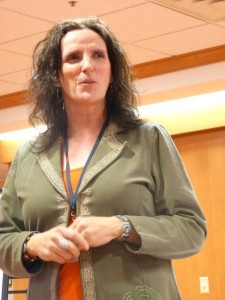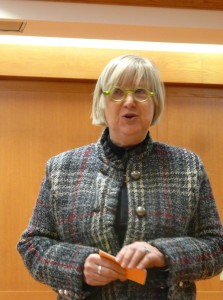Cindy Greenlay, therapeutic recreation manager at Winnipeg’s Simkin Centre, is one of the first to admit that no one plans to retire and move into a care home. But, she explained, “Circumstances happen and the support we’re able to provide here is something needed in the community.”
On Feb. 18, the women’s philanthropy of Combined Jewish Appeal (CJA) in Winnipeg hosted an educational evening at the Simkin Centre on the centre’s programming. Daniela Jacobson, co-chair of women’s philanthropy, began the event, noting that the Simkin Centre “is our newest agency to the Jewish Federation of Winnipeg.” She then gave the floor to Greenlay.

According to Greenlay, people don’t come to the Simkin Centre at the end of their lives to die – they come to continue living. Something about which the centre staff feel strongly is the importance of getting to know each of the residents individually. “We don’t assume that everyone who is 75 likes to play Bingo,” said Greenlay by way of example.
The staff meet with each resident several times and gather as much information about what he/she likes to do, so they can build activities to match. One of the most important things to understand, said Greenlay, is that residents have a lot of free time on their hands and the centre needs to fill that time with relevant programming.
“We need to do that every single day – 13 hours a day,” she said. “As 80 percent of our population is cognitively impaired, so we have some people here who make those choices…. We’re all trained in specific areas to adapt to different disabilities…. We have one recreation staff for every 40 residents. That person works five days a week to fill up this big piece of the pie.”
The centre’s programming is funded by the local Jewish federation and private donors.
“To brag a little bit, our facility is chosen every year by Red River College to bring the recreation students to,” said Greenlay. “The students come here every fall to see what they want to be when they ‘grow up.’ They shadow our staff every fall to see what the programs are supposed to look like.”
Until a year ago, Simkin’s spiritual health care was led by Rabbi Neal Rose, and it was based on a chaplaincy model. “Once Rabbi Rose retired, the board met and did some rethinking,” said Barb Findlay, the centre’s spiritual health care practitioner. “They researched what spiritual health could look like going forward. I think that in the whole world – and the Jewish world is not different – generally, people today are less religious and more spiritual. People use yoga and meditation and different ways to access the Divine. It’s interesting, as I go around and meet new residents and introduce myself, I get one refrain that I hear all the time, ‘Wait a minute. I’m not too Jewish.’ And, you know, actually, they are very Jewish.”

Spiritual health has been recognized by the Canadian Medical Association and the Winnipeg Regional Health Authority (WRHA) as an integral part of the health profile, which includes physical and emotional health.
“Spirituality is defined as that which gives meaning and purpose to life, besides the physical,” explained Findlay. “The purpose of spiritual health is to symbolically walk beside people and to occupy that liminal space between what’s known and what’s not known in life.”
Although the overwhelming majority of people at the Simkin Centre are Jewish, the centre operates as the Victoria Hospital emergency placement location. As such, the spiritual health personnel have to provide support for people from all religions, including Buddhists, Catholics, Evangelical Christians and First Nations.
“What is important is their belief system and helping them to boost that and work with that for whatever needs they have,” said Findlay. “Israel has embraced this new profession. They named it the ‘livui ruchani,’ which is Hebrew for ‘spiritual accompaniment.’
“The Simkin population is roughly 200, and about 15 percent aren’t Jewish,” she continued. “The average age is 90, and about 85 percent of our people have some element of dementia. Ninety-six percent of elders live out their lives in the community with or without some supports, so, what we have here is a very small percentage of our elderly population – about four or five percent.”
Dr. Harvey Chochinov, a geriatric psychiatrist in Winnipeg, has dedicated much of his work focus to end-of-life care, and has found that distress at the end of life is usually connected with people feeling as though they are a burden.
“He’s developed a whole process which involves questioning and reflection, so we can help people review and rebuild, and hopefully move away from feeling they’re a burden for their loved ones,” said Findlay.
The evening’s talk ended off on a lively and light note, with Cindy Bass, the centre’s music therapist demonstrating how she engages residents. “Music memory is one of the last remaining faculties for the elderly population with Alzheimer’s disease,” said Bass. “For example, if you take a song like ‘My Bonnie Lies Over the Ocean,’ everybody knows it. And it’s been shown that some people who can’t speak anymore can still sing, which is also why it works well as therapy for stroke victims, helping them relearn to speak.”
Music can increase attention span and be very useful for the cognitively impaired, she added, as it opens new brain pathways, evidence of which has been seen using MRIs.
Bass led the crowd in a few songs to illustrate the power of music and she explained the many benefits gained through music, including the building of community ties and increased socialization, as well as its use in prayer and to enhance self-expression.
“Music,” she said, “provides people of all ages, regardless of disability, with ample opportunity for meaningful responses to all aspects of our environment.”
Rebeca Kuropatwa is a Winnipeg freelance writer.
